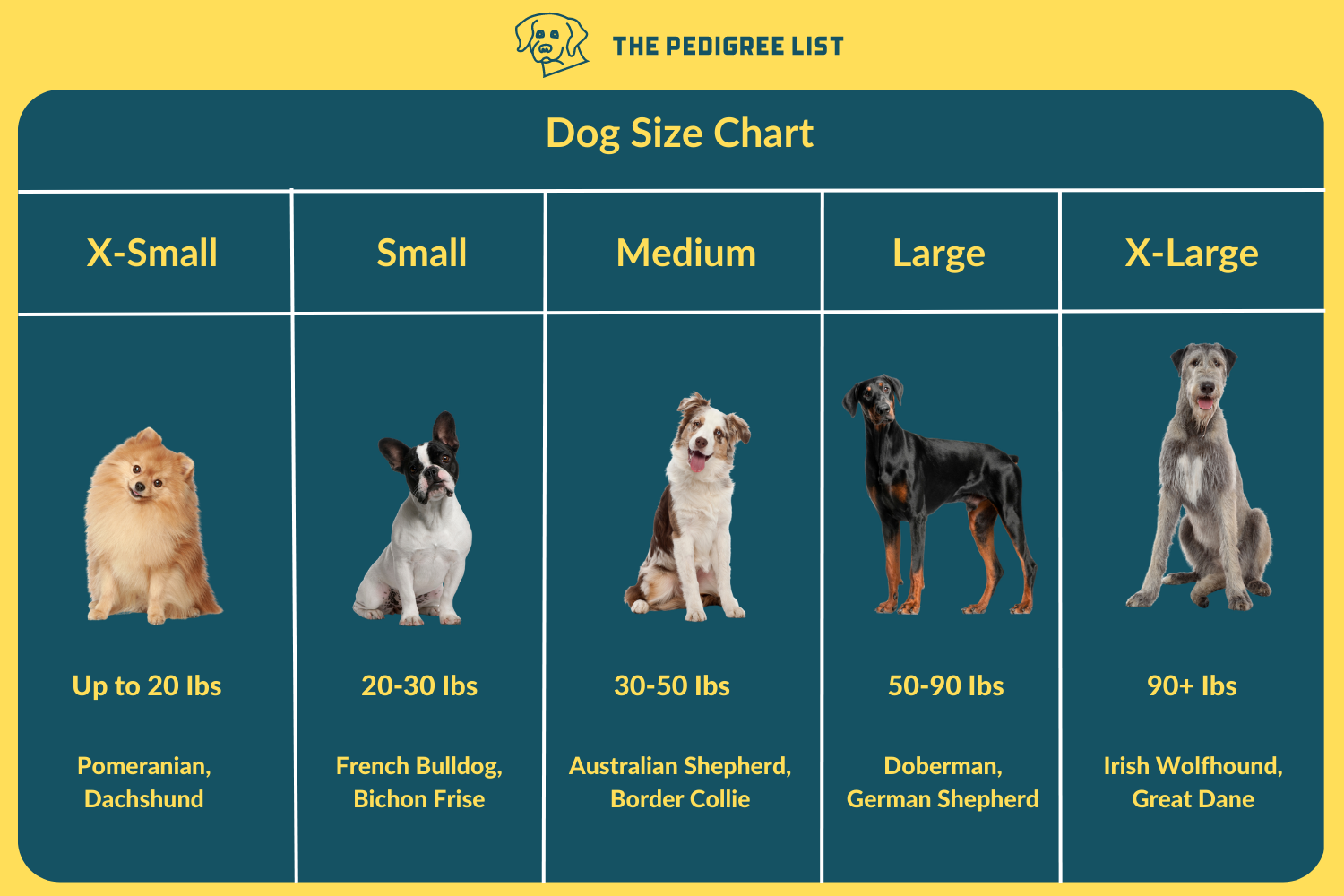The Ultimate Tool To Compare Dog Breeds: Discover the Perfect Breed for You!

The information below is solely for educational purposes.
I remember when i was deciding on what dog breed to choose the amount of information out there was overwhelming and it seemed like every article or video said slightly different things about what it was like to own a dog breed i was interested in.
As a result i wasted HOURS (if not days) reading/watching videos on different dog breeds that didn't actually tell me anything new.
That's why i decided to create a dog breed comparison tool which you can use for FREE and compare all the information on the dog breeds you are interested in looking at easily.
The best way to compare dog breeds accurately is to base the information on REAL owner reviews instead of someone who has just copy and pasted breed stats into an article.
Alongside that you can also check out the dog breed finder page (also FREE to use) which lets you filter for dogs based on your lifestyle preferences and read REAL owner reviews of what it's like to own a specific dog breed.
Anyway, let's dive in!
Why is it important to compare dog breeds before purchasing one?

Choosing the right dog breed is an essential step in welcoming a new fur baby into your life.
With hundreds of breeds to choose from, each with unique characteristics, temperaments, and needs, it's crucial to find a breed that aligns with your lifestyle and preferences.
By selecting a breed that suits your living situation and personality, you'll be more likely to enjoy a long, happy relationship with your canine companion.
This article will guide you through various factors to consider when comparing dog breeds and provide an overview of popular breed categories.
Stay tuned as we explore the world of dog breeds and help you discover the perfect breed for you!
Factors to consider when comparing dog breeds

A. Size and space requirements

One of the primary factors to consider when comparing dog breeds is size. Do you want a large dog or a small dog? Or something in the middle?
Dog breeds come in various sizes, from tiny toy breeds like Chihuahuas to giant breeds like Newfoundlands that can weigh over 100 pounds.
When comparing two dog breeds it's essential to consider the space you have available in your home and yard and how much you want to share with your new dog!
Small dogs may be better suited for apartment living or living in cities where you need to travel with them on pubic transport more, while large dogs generally need more room to roam and play.
However, keep in mind that some large breeds can be suitable to smaller living spaces, as long as they receive regular exercise and mental stimulation so keep this in mind when you compare breeds on size.
I know this from personal experience as i have a full sized male Doberman in a 2 bed apartment!
There can also be big differences in size between a male and female dog breed.
Make sure when using a side by side comparison that you are comparing the same sex too.
B. Temperament and personality
When you compare dog breeds, being aware of the different temperaments and personalities each dog breed has is vital to make sure you make the right choice.
Some breeds are known for their friendly, outgoing nature, while others may be more reserved, independent or protective.
Consider your own personality and the type of canine companion you'd enjoy having by your side.
Do you want a dog that will be super protective and be low on the dog friendliness score which might make it more difficult to make new dog friends like a Cane Corso or would you prefer a laid back breed that lounges around the house and is happy to nap all day like an English Bulldog?
Additionally, if you have young children or other pets, it's essential to choose a breed known for being a good family dog and good with other animals.
You do not want a high prey drive breed in a household that has small furry animals!
C. Time investment - Exercise and energy level
This is a big one and is often overlooked as it's easy for new owners to think that they can spare an extra hour or 2 per day to exercise their dog.
However, when life gets in the way or if you like doing spontaneous things like going for food after work or an early gym session than having a high energy dog with high exercise requirements can reduce your ability to spend as much time on other leisure activities.
If you have a busy job you dont want to be coming home after a 10 hour shift and then having to walk your dog for 2 hours!
This is one of the main reasons people give up their dogs because they simply didn't understand how much time they would actually need.
It's not just the walking time you will need to consider when looking at a dog breeds activity level, it's also the time to clean them after a walk if they are muddy and their general mental stimulation needs throughout the day.
Again, reading real owner reviews when researching dog breeds is the best way to see how much time is needed to keep your dog satisfied each day.
Having a a highly energetic dog breed suits more active owners that enjoy long walks and hiking.
To see dogs that have low, medium & high energy requirements you can see this information easily on the dog breed selector page here.
D. Grooming and maintenance
Another aspect to look for when using a dog breed comparison is the time needed and cost involved in general grooming of a dog breed.
Some dog breeds like Japanese Akitas have double coats and are heavy shedders. Especially in warm weather they can moult even more!
If you have the time or budget to groom them multiple times per week and dont mind dog fur all over your house then these dogs can be great picks but if you are house proud and like everything to be spotless then it's best to avoid this type of dog breed.
E. Health and lifespan
Health & lifespan is a massive factor when you compare dog breeds as it can vary significantly.
Some dog breeds are more prone to serious health issues which can lead to some big vet bills and expensive insurance.
For example, English and French Bulldogs both are prone to breathing and skin problems.
I have a friend who has an English Bulldog and the insurance is nearly double what it costs me to insure an intact male Doberman.
Larger breeds dogs generally have a lower life expectancy like purebred Great Danes or Bernese Mountain Dogs which can sometimes only live up to 7-8 years.
You can easily compare health issues & life expectancy when using our dog breed comparison tool.
F. Training and intelligence
Some dog breeds are inherently more intelligent than others.
For example the Border Collie is widely regarded as the most intelligent dog breed and has been shown to understand more than 200+ words.
As a herding breed it has been bred to herd sheep and therefore has incredible stamina and understanding of it's owners commands.
Now this sounds great, surely everyone would want an intelligent dog breed?
However, as a result of being so smart intelligent breeds can get bored easily and if not mentally stimulated enough can go on to be naughty, destructive or just plain annoying!
If my Doberman is bored and i cant entertain him straight away he will 100% make me know. He starts off by stealing boxers from the washing basket and then waiting until i chase him down then proceeds to start digging on the sofa!
As he is so intelligent it means that they have a lot higher requirements than other breeds.
Compare this to his best friend Reggie the English Bulldog who will happily lie at my feet all day as long as he is fed and has been to the toilet. The contrast is like night and day!
G. Cost of ownership
When using a dog breed comparison tool understanding the true costs involved of owning a specific dog breed is super important and the best way to find this out is by speaking to real owners of the dog breed.
Now it goes without saying that some owners will pamper their dogs more than others and other big factors that come into play is the type of dog food you feed your dog.
Raw diets will generally cost a lot more than cheaper kibble but can have more health benefits.
Other things to consider are the cost of insurance, grooming costs, dog walking or daycare costs, kennels if you go on holiday and general treats.
The larger the breed the more expensive their upkeep will be so bare this in mind when considering which is the best dog for you.
Another thing to bare in mind if you are getting a puppy is how much it costs to buy the puppy in the first place. Some pedigree dog breeds can cost $10,000+ if they have rare markings or are from award winning lineages.
Generally the dogs that are more trendy at the time like The French Bulldog will cost more than a less trendy breed like a Labrador.
As the costs vary so much the best way to get a rough idea of expenses is to see what other owners have recorded in dog selector app.
Conclusion
Choosing the perfect dog breed can feel overwhelming and requires a lot of thought to get it right so that you find a breed that suits your lifestyle.
Our dog comparison tool is designed to make this process easier, guiding you through the comparison of different breeds and their unique characteristics.
By using our innovative tool, you'll be better equipped to make an informed decision when looking at dog breeds and ultimately find the perfect canine companion that complements your lifestyle and preferences.
Checkout the dog breed finder tool today!

